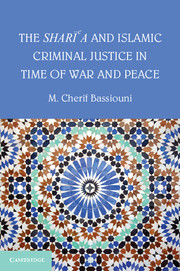Book contents
- Frontmatter
- Contents
- Glossary of Terms
- Table of Abbreviations
- Introduction
- 1 The Sharīca, Islamic Law (Fiqh), and Legal Methods (cIlm Uṣūl al-Fiqh)
- 2 The Postulates of Human Rights and the Place of Justice in Islam
- 3 The Islamic Criminal Justice System
- 4 Islamic International Law and International Humanitarian Law
- 5 The Sharīca, Islamic Law, and Contemporary Post-Conflict and Transitional Justice
- Appendix A Chronology of Significant Dates in the History of Islam
- Appendix B Armed Conflicts Involving Muslim States
- Appendix C Statute of the International Islamic Court of Justice
- Appendix D The Cairo Declaration on Human Rights in Islam
- Appendix E Convention of the Organization of the Islamic Conference on Combating International Terrorism
- Bibliography
- Index
- References
1 - The Sharīca, Islamic Law (Fiqh), and Legal Methods (cIlm Uṣūl al-Fiqh)
Published online by Cambridge University Press: 05 June 2014
- Frontmatter
- Contents
- Glossary of Terms
- Table of Abbreviations
- Introduction
- 1 The Sharīca, Islamic Law (Fiqh), and Legal Methods (cIlm Uṣūl al-Fiqh)
- 2 The Postulates of Human Rights and the Place of Justice in Islam
- 3 The Islamic Criminal Justice System
- 4 Islamic International Law and International Humanitarian Law
- 5 The Sharīca, Islamic Law, and Contemporary Post-Conflict and Transitional Justice
- Appendix A Chronology of Significant Dates in the History of Islam
- Appendix B Armed Conflicts Involving Muslim States
- Appendix C Statute of the International Islamic Court of Justice
- Appendix D The Cairo Declaration on Human Rights in Islam
- Appendix E Convention of the Organization of the Islamic Conference on Combating International Terrorism
- Bibliography
- Index
- References
Summary
Introduction
As the descendants of Ibrāhīm (Abraham), Jews, Christians, and Muslims worship one God, whose teachings have been revealed through several prophets and messengers, but principally by Moses, Jesus, and Muḥammad. In the case of Jews and Muslims, specific divine revelations control. However, these two monotheistic religions each perceive this One God somewhat differently, even though they are quite close in their overall perception of the Almighty. The God of the Jews described with utmost reverence in the sacred letters YHWH is the indescribable God referred to in Moses’ First Commandment (which Jews and some fundamentalist Christians believe to have been revealed by God). This perception of God is the same in Islam, and it was the same in Christianity until the Council of Nicaea in 325 CE, which interpreted God as consisting of three components in one being, the third being Jesus, understood as the son of God, or the incorporation of God in human flesh. Judaism and Islam specifically reject that interpretation of the Oneness of God.
For all three Abrahamic faiths, God is the ultimate source of law, and humans are to apply God's law. Therefore, legal concepts in all three religions have emerged from the work of theologians. The reader must understand that in a Muslim society, the law cannot be exclusively secular insofar as it is derived from God. This is also the case within the Jewish Orthodox community. This is true even when legal methods, techniques, and applications are inspired by secular sources. All legal matters, whether concerning substance, procedure, evidence, remedies, and penalties, must conform to the source, the uṣūl, which is the sharīca. In this respect, the sharīca is like a secular state's constitution to which treaties and enacted laws must conform. Nothing in the sharīca prohibits modern codifications of laws, procedures, and evidentiary rules, or the development of judicial systems similar to those of non-Muslim secular states. In fact, a number of Muslim states have done so.
- Type
- Chapter
- Information
- Publisher: Cambridge University PressPrint publication year: 2013
References
- 1
- Cited by



